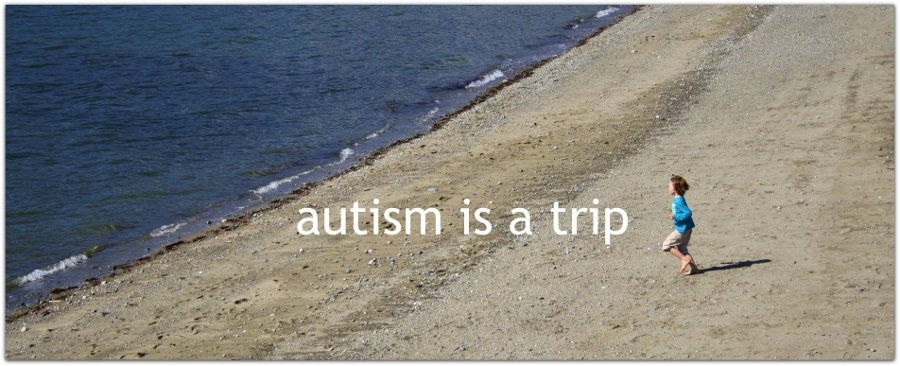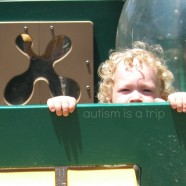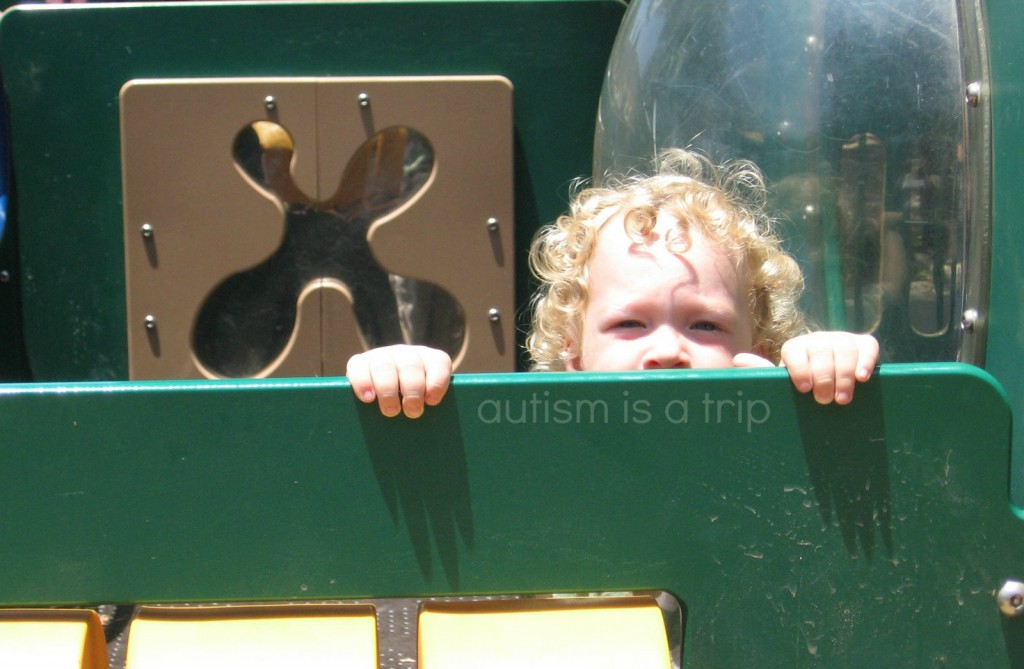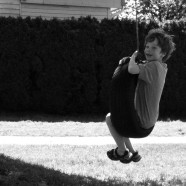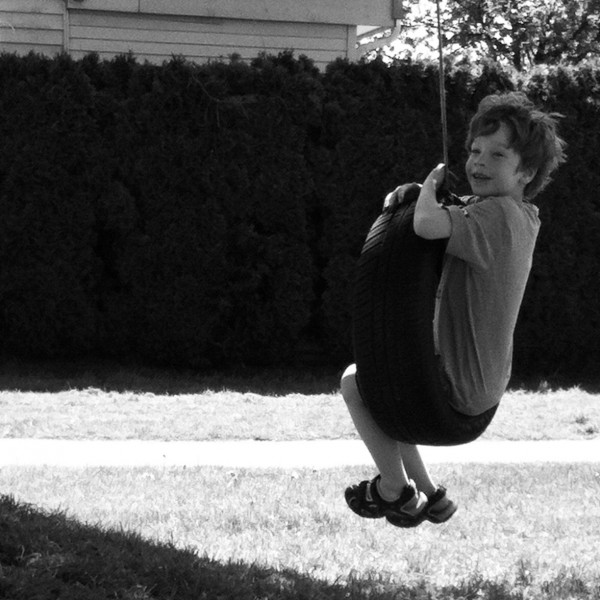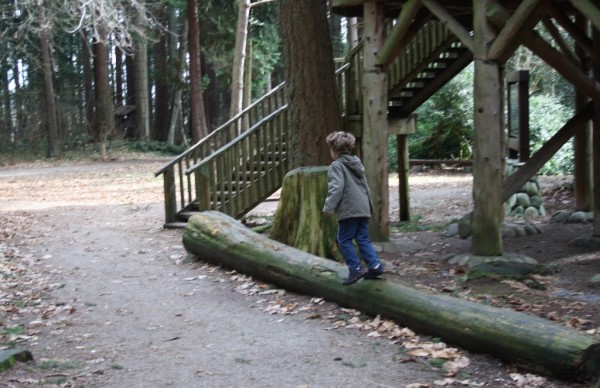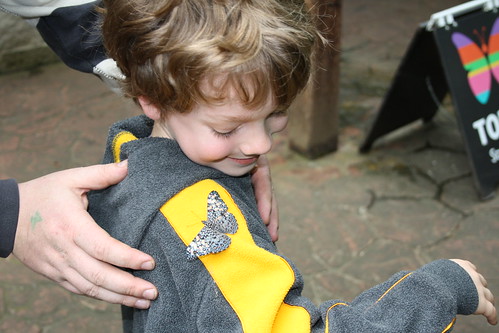Autism in British Columbia: Crisis in Process
My son Jack was born in the United States and raised in Los Angeles until the age of four and a half. Just before he turned two, he entered the California Early Start program for children with a risk of developmental delay or disability. We called for an appointment in August of 2o06, and by the end of September of the same year, he was enrolled in a variety of interventions and therapies.
At age three, he was formally assessed and diagnosed with autism by both the Lanterman Regional Center and the Los Angeles Unified School District (LAUSD). He was transferred to autism-specific supports, where he remained until we moved.
From the time Jack was twenty-two months until he was four and a half, Jack received the following interventions and therapies:
AGE TWO
- Collaborative preschool with typical peers in a clinic-based classroom, three-to-four days a week
- Two hours a week of clinic-based Occupational Therapy
- Two hours a week of home-based Speech Therapy
- Several sessions of Feeding Therapy
- He was also offered full-time preschool, additional Occupational Therapy, Floortime Therapy, and Respite Care, which we did not feel were necessary at the time.
AGE THREE to FOUR
Provided by LAUSD:
- Individualized Education Program (IEP) support
- Collaborative preschool with typical peers in a public school classroom, five days a week
- Full-time Behavioural Intervention Implementation (BII) aide at school
- Two half-hours a week of school-based Speech Therapy
- Two half-hours a week of school-based Occupational Therapy
Provided by Lanterman Regional Centre:
- One hour a week of clinic-based Occupational Therapy
- Twelve hours a week of home-based Applied Behaviour Analysis (ABA)
- Respite Care
- Parent training workshops
We also supplemented his therapies at home, with strategies learned from his providers.
Several of the supports at school and at home were coordinated through the same non-profit organization, so there was continuity in both areas. We felt very confident that our son was receiving every support he needed, and that should he need more, the options were available to us.
We were given choices of providers and schedules, and the ability to change supports and therapies as we saw fit, but we were guided through the process by a social worker at Lanterman (Early Start), and then a caseworker at Lanterman, a support worker at LAUSD, and a coordinator at the non-profit who provided our BII and ABA aides.
It is important to note a couple of things. First, we never saw a bill. Not once. My husband and I signed authorization forms, reports, and time cards, but we were never financially responsible for anything.
Secondly, we were given suggestions and options as to what Jack needed, according to several observations and reports. We were able to give our input, but we were not responsible for creating his treatment plans. We never felt like the burden of figuring out what he required was on us.
Finally, we never saw a pediatrician or medical doctor (other than the diagnosing psychiatrists) for Jack’s autism. In fact, it came as a bit of a surprise to his pediatricians when we told them about his diagnosis. Jack has never had any of the health issues commonly associated with autism, and as it is not required in California, we had no reason to include his doctors in the diagnosing process.
When our family moved to Canada, Jack was in the process of transitioning from preschool to Kindergarten. In Los Angeles, he would have had full-time BII support, and continued with both speech therapy and home-based ABA (he had graduated from clinic-based occupational therapy) for as long as necessary.
I cannot speak to how his support would have waxed or waned over the school years, but I have only good things to say about our experiences up to that point.
I can, however, tell you what happens here in British Columbia.
Once we were settled, we were required to get Jack a new autism diagnosis from a Canadian doctor in order to qualify for provincial autism funding. Government funding is Canada’s answer to autism support, similar to the Regional Center system in California.
First, we had to see a pediatrician, and convince him Jack needed a referral for diagnosis. I was honestly shocked when he balked at giving it to us, even though Jack had already been formally diagnosed in the United States. Twice. The doctor wanted to rule out ADHD (which, it turns out, Jack does have), and Fragile X Syndrome (which he does not), before he would even consider referral. I pushed, though, and he relented.
Next came The Wait. We were told the wait time for assessment would be almost two years, and indeed it was fourteen months before he was seen.
Fourteen months is forever in the life of an autistic child and their family.
It can also be the difference between full- and no-support.
Children assessed with a spectrum disorder in BC under the age of six receive $22,000 a year of funding to pay for their various supports. The family is responsible for deciding which therapies and interventions are necessary, and all of the hows and whens and whos of making them happen. I know how overwhelmed we were in Los Angeles, and we had several agencies overseeing and coordinating everything for us.
Many families in BC are lost and confused as to what is necessary and when, and who to trust to give them good advice. They are expected to become autism experts overnight, and to know what their child needs at any given time.
Once a child on the spectrum reaches age six, the yearly funding drops to a mere $6,000. To cover every single thing the child or young adult needs.
$6,000 doesn’t go very far, in case you’re wondering.
Now consider the child who has been waitlisted until they are six or seven, eight, or older. Those children don’t get retroactive funding; they’re given the same $6,000 every other child over six gets.
$6,000 to sink or swim.
My husband and I often wonder where Jack would be in his development if he hadn’t had such intensive interventions and instead had to wait years to be seen. The difference between the two months it took in Los Angeles and the fourteen months it took in British Columbia is monumental.
It’s a lifetime.
In the first fourteen months of Jack’s therapies, he learned to use his upper body. He learned how to play.
He learned how to talk.
I cannot stress enough how important the first year of Jack’s interventions was in shaping the person he is today. That time was invaluable to him, and to us.
I have met many families of autistic individuals here in BC and have heard a lot of stories. Some wonderful, many concerning. Some downright terrible.
In the Lower Mainland, where we live, there is only one team that assesses and diagnoses autism. One team for a large and rapidly growing population – the fastest growing region in Canada.
Wait times to be seen are so outrageous, families who are financially able resort to paying for their own assessments out of pocket. Even those clinics now have tremendous wait times.
Yes, there are legitimate circumstances where a child may be older before he or she is diagnosed, but for families seeking help for younger children, the situation here can be bleak.
I cannot imagine where Jack would be today without the solid start he got at a very young age.
I cannot imagine the kind of support he would have gotten if we had to decide his plan of action alone, without professional guidance.
I cannot imagine the outcome if we had had serious budget restraints, or had to turn down therapies because we simply could not afford them.
Autistic children in Alberta get up to $60,000 a year for supports through age 18. Why should children in British Columbia not get the same?
Why do children over the age of six get so much less than younger children? Is autism less severe over the age of six?
Why are families left to fend for themselves in a province so well known for caring for its citizens?
It breaks my heart to see even one child go without the therapy and intervention he or she desperately needs. I don’t understand how a province can willingly stifle the potential of certain individuals because of their age or where they live.
It’s just not right.
It’s not Canadian.
It needs to change.
Share this: Twitter | StumbleUpon | Facebook | digg | reddit | eMail Read MoreA Tragedy in BC – Failing The Caregivers
Autism Awareness (ought to be Acceptance) Month is winding down, and unlike April, it will not go out like a lamb. The lion of autism injustice is still roaring, louder than ever.
While people are walking and gathering and fundraising and celebrating the wonders and gifts of autism (which I wholeheartedly support), the dark underbelly is growing. It’s time for us to face it.
Death has become altogether too common in the autism community. Every week or so there’s another story about an individual who has bolted or wandered and not made it home. And every month or so, an autistic individual is harmed or murdered by a caregiver.
The tragedies are too numerous to count, and happening much too often. They are also hitting closer to home – both in proximity and emotion.
Our children are in danger.
Issy Stapleton. Alex Spourdalakis. And now, Robert Robinson.
Last week, British Columbia resident Angie Robinson murdered her 16-year-old autistic son, then took her own life.
It’s easy to automatically blame Angie. How could a mother possibly take the life of her own child? What kind of parent does that?
A desperate parent. A parent who has reached the end of their resources, both physically and mentally. A parent who believes they have absolutely no other answer.
Nobody thinks they could ever get to the point where suicide and murder are a viable option. We all assume if things get dark enough, someone will appear with a light.
No parent, even a parent of a profoundly disabled or autistic child, wants death (I’m assuming the best, of course). Even at the very end of the rope, we are still hanging on, holding out for a glimpse of hope.
But occasionally, the darkness consumes everything, and no light can get through. There is no hope. Or, at least, that’s what a desperate parent believes.
Yes, the violent acts visited on children by their own parents and caregivers is atrocious and unimaginable. No child should ever fear for his or her life in their own home. I am not suggesting that what Kelly or Angie or Alex’s grandmother did are acceptable in any way.
But I do understand them. And I can understand how things could get so desperate for them that they felt they only had one solution.
It all comes down to support. The proverbial village. The village that supports the child needs to support the caregivers and parents, too, and therein lies the rub.
Autism supports vary from country to country, province to provice. There is no standard of practice or care even within a the US or Canada. Children and individuals with autism often need intense, one on one care, either in the home or a residential facility. Not every family is equipped to handle these situations, yet there is often little in the way of respite and support for them.
As far as I can tell, support for caregivers is pretty much nonexistent. If a family member requires placement or full-time care and none is available, what is the caregiver to do? Between a lack of professional support and the overwhelming costs of respite and residential care, it should really be no surprise that parents are losing hope.
There are two victims in these crimes. Two lives lost. Two stories that didn’t have to end this way.
When a desperate parent decides to kill their child and themselves as a way out, the entire autism community has failed.
We have failed the child by not giving them everything they need to live a happy life to best of their ability.
We have also failed the caregiver by not recognizing that a healthy caregiver is essential to a healthy, happy autistic individual.
We cannot expect autistics and their families to survive and thrive if they are constantly at war just to get support.
Any one of us could reach the limit. Or anyone we’ve met. Nobody knows just how much someone can take, and what will be their breaking point. We need wholesale change in the way we support autistic individuals and their caregivers. The reality is if the caregiver is too stressed and is getting no help or relief, the whole family is in potential danger. These horrible stories will continue until something big changes.
Caregivers need to be heard and helped when they reach out. By the time a parent reaches the point of murder and suicide, it’s too late. Families need care and support from the very beginning, not just when things get rough.
Until then, keep your ears and shoulders available for your friends, in real life and on the internet (which is oftentimes who need it the most). Be a friend, be aware of what’s happening. Also, don’t hide your situation from the world. Open up to anyone you think will take you seriously.
And let your local government know how you feel about caregiver support and the lack thereof. Be loud, and be heard.
If the system can’t/won’t help us, we have to help ourselves.
Share this: Twitter | StumbleUpon | Facebook | digg | reddit | eMail Read MoreVindication… and Obligation
It’s over. Our long journey for a Canadian autism diagnosis has ended, and we are victorious.
So why am I so tired?
We went to our family diagnosis and funding meeting this week, girding ourselves for any outcome. I wasn’t hiding my nerves well, so the wonderful doctor let us off the hook immediately. Jack is on the spectrum, he has ASD. We knew that, but there were no guarantees the team would agree. Thankfully, they did, and now Jack is eligible for all the support that Canada and the British Columbian government have to offer.*
After she presented the official diagnosis, we met with a case worker who explained the funding process, and where to go now. Unlike in California, where either the school district or the regional centers handled coordination of services, we will make most of the decisions ourselves. It’s a bit confusing, but I’m glad we have a lot of experience in the autism world to guide us.
We sat in the car afterward, letting it all sink in. I felt relief, I felt happiness… and I felt a weight bearing down on me. My husband and I looked at each other. We were both thinking the same thing.
Jack is special. Jack has always gotten exactly what he’s needed, and then some. But other children are special, too. Our monumental task is over, but our – my – biggest job is just beginning.
Since Jack was diagnosed, before even, he has had the full support of everyone charged with his care. We call him the “poster child for early intervention”, and it really is quite true. Every step of the way, he’s had exactly the therapy he’s needed, the support he’s required, and the attention he’s deserved. Here in BC, where his school has not yet received a penny for his support during the year and a half we’ve waited for his diagnosis, Jack has had a full-time special education assistant (SEA).** Even though we have occasionally had to wait, Jack still prevails in the end.
I know many, many families in the autism community, and their stories are all different. There are children who are lower functioning, there are children who are high functioning. There are children with asperger’s, and children with PDD. The spectrum is wide, and so are the services they’re receiving. I would love to say every child is getting exactly what they need, but that simply isn’t true.
I know children who are not supported in school, and children who have had to leave school because of it. I know children who need speech therapy or occupational therapy or sensory integration therapy, but linger on waitlists or are simply denied due to lack of funding. I know children who have waited years for an accurate diagnosis, without which they cannot even get on those waitlists.
I won’t say we’ve had an embarrassment of riches when it comes to Jack’s therapies, interventions and supports, as he’s needed and deserved every one. But that feeling lingers when I speak with parents so desperate for even a fraction of what we’ve had. It pulls at my heart and puts a fire in my gut.
The weight I feel is obligation. I cannot allow my fight to end with Jack. He is my child and it’s my duty to advocate for him, but someone needs to stand up and speak for those who are not as fortunate, for whatever reason. Autism is many things: daunting, confusing, challenging, and oftentimes inspiring. What autism need never be, though, is a tragedy. Every single child and individual on the spectrum deserves the chance to be the best they can possibly be, through therapies, interventions, supports, or whatever it takes. Every family touched by autism deserves to know they’re not alone on their journey.
Jack and I have completed this leg in our marathon, and we have every intention of winning the whole thing. We also intend to take as many with us as we are able. We can, and we will.
“You gain strength, courage and confidence by every experience in which you really stop to look fear in the face. You are able to say to yourself, ‘I have lived through this horror. I can take the next thing that comes along.’ You must do the thing you think you cannot do.”
― Eleanor Roosevelt,
**************************************
*Which isn’t a whole lot, honestly, but that’s another topic for another post.
**I was quite pleased to take in his diagnosis paperwork yesterday, which will now entitle his school to $18,000 a year specifically for his support.
Share this: Twitter | StumbleUpon | Facebook | digg | reddit | eMail Read More
A Follow-Up…
I’ve had a lot of responses to yesterday’s post about Jack’s “new” diagnosis, and I’ve been thinking about what it is that’s bothering me the most. A comment this morning hit it on the head:
“It sounds like your son has adapted to may things and so those who tested him determined his diagnosed could be ‘updated’. I think the autistic traits remain, the kiddos just learn to blend in to what is expected of them socially, etc.”
I read this and it struck me. I’m afraid, because, in my mind, Jack hasn’t evolved out of autism. I believe he’s every bit as autistic as the day he was diagnosed, he’s just older.
Jack is a brilliant product of Early Intervention, which means we threw all kinds of therapies at him as quickly as possible. And you know what? They worked. But he still has autism, and that means several things.
It means that while he keeps up with his peers in school in terms of schoolwork, he simply cannot function in a school setting without constant supervision (he has a full-time SEA). His teacher is out for the rest of the school year due to surgery, and I fully expect Jack to backslide until he gets used to the change.
Jack is easily overwhelmed by stimuli, and we have to plan our lives around that. We rarely do things after school, as he needs that time to decompress from his day. There are many places we cannot go, because of various things that bother/irritate/terrify him (like the buzzers at the hockey rink adjacent to the indoor playground).
He is hyper verbal, to the point that he thinks every conversation is directed at him, and if he has something to say, he will do anything, including screaming at the top of his lungs, until he gets the floor. We’ve recently realized that giving him simple math problems will buy us enough time to finish our quick discussion about what to get at the store.
Jack has to be constantly engaged at home or he gets restless. This can mean anything from doing laps of the house to throwing his brothers down the stairs for sport. His aggression has increased with his age, and in a house full of boys, that’s a scary prospect.
Jack does not understand social boundaries. He will hug and touch complete strangers, and not grasp why it’s wrong. This particular behavior really scares me.
I honestly don’t believe Jack is “out of autism”. I think he’s smarter than the ADOS. I think he had a “good” day for his assessment. I can tell you if they had assessed him based on his behavior on the way home, there would have been no question.
I identify with autism because I am an autism mom. Yes, my child is high functioning, but he still has autism. Every day brings a new challenge, and every day is exhausting. Jack and I both need the services he’s getting, and then some. I’ve been waiting patiently for a year and a half to re-start his home-based ABA therapy, and the prospect of never getting it wrenches my stomach.
I realize now I’m clinging to the autism label as a lifeline, because that’s what it is. I know my child responds to therapies, that part is obvious. The prospect of facing a future without support, though, terrifies me.
I feel exactly the same way I did when Jack was initially diagnosed, except now there’s an additional layer of panic. I cannot let autism be taken away from us. I just can’t.
Share this: Twitter | StumbleUpon | Facebook | digg | reddit | eMail Read MoreBecoming Aware
One of the things I wonder about is how Jack will be when he grows up. Will he be self-sufficient? Will he have an amazing job? Will he have a wife and children? And also, at what age will he “become aware” of how his brain is different?
All parents wonder and worry about their child’s future. Special needs parents worry on a different level, hoping the child will be able to cope and make their way without constant support. And for those children who cannot, we hope the safety net will always be strong.
Jack is only five and a half years old, so while I think about those long-term things, I’m focused on the “right now.” And right now, I’m thinking about grade one. How will he be in a class where he’s required to sit at a desk most of the day? What will he be like as the school structure tightens? At what point will Jack begin to realize that he’s slightly “different?”
We’ve never sheltered Jack. He’s always been in “inclusive” or “collaborative” classrooms, which are integrated with both special needs and neuro-typical children. He’s almost always had a Behavioural Interventionist (BI in the US) or Special Education Assistant (SEA in Canada), but the other children have merely treated those individuals as an additional teacher, not a thing that makes Jack different. Perhaps at this age children are just still blissfully ignorant of difference.
We have, however, noticed little signs that Jack is recognizing his quirks and needs. In the classroom, Jack knows when he is overwhelmed and needs to to take a “break” (he can go out into the hall or another room to escape the chaos). At home, he often spends hours building train tracks, or sometimes he sits and watches Treehouse. I know that sounds like every other five-year-old, but in Jack’s case, he seems pretty in tune with what activity suits his sensory needs at any given time.
It’s the wild card situations that still give me pause and worry – will Jack be ok in a new hotel on our vacation? Will he enjoy the various activities we have planned over spring break? Will Jack integrate well at a friend’s birthday party? In our five-and-a-half years together, I’ve gotten pretty good at anticipating Jack’s needs and acting accordingly, but as he gets older, I am surprised more and more with how much less I need to do. Of course I still need to manage our time (time spent at an activity, time spent away from routine, time until meals and bedtime, etc), but that is the endless job of a mother – Time Manager. Nowadays, if I do my job well, Jack is fine and thrives.
We took a short trip to Victoria, BC for spring break, and got to see and do a lot of wonderful things. We planned a visit to the Victoria Butterfly Gardens to spend some time with the butterflies. Jack was excited, but I wondered what he’d do once we got there. We had visited the Vancouver Aquarium the week before, and he had been overwhelmed by the Amazon exhibit that included butterflies. He swore this time would be different, and he was all in.
Due to perfect time management on my part, we arrived right in the middle of naptime. Peak problem time for not only Jack, but all three boys. Lennon whined to go home immediately, Kieran kept trying to get into the river that ran throughout the sanctuary, and Jack swatted at the beautiful Blue Morpho butterflies soaring past him. As much as he swore he loved them, every time they came near he jumped and batted at them.
We persevered, and eventually got what we had hoped for – a butterfly encounter, thanks to a box of brand-new baby butterflies who much more amenable to being touched and worn by little boys.
Jack had a great time, and loved every part of it. Hindsight saved the experience. Well, hindsight and some baby butterflies with a lot of patience.
So I guess the wild card situations are getting better, too. Perhaps it’s as much Jack getting to know himself as it is my awesome time management skills. At a birthday party recently, he said something that gave me a little glimpse of things to come. I was concerned about a party with a lot of children Jack didn’t know, right in the middle of the afternoon (again, naptime). The party was close to home, though, so I figured we could always leave if things got hairy for him.
As the children mingled and played before the party activities, Jack was buzzing around the house like a little bee checking everything out.
“There’s a lot of stuff to see here,” he told me.
“Yup.”
Jack went on. “It makes my motor go all weird.” He gave me a big smile and moved on to the next thing.
(I am always impressed with this home, let me add. They have three little boys about the same age as mine, yet manage to somehow make it look as if adults live there, too. I haven’t quite conquered the monkey to big people ratio and am infinitely jealous.)
Jack finished his tour of the home, and settled in to check out their toys, in a playroom separate from most of the other kids. He played every party game, he ate hot dogs and cake, and had a ball.
When we got home, I asked Jack what his favourite part of the party was. He told me he liked being able to go back and forth between the party and the toy room. Adaptation, realized.
I have fears and anticipation for Jack’s future, but I’m slowly recognizing that I am not in control – Jack is. And as Jack gets to know himself, he’ll take the reigns from me. I’m not sure I’ll be ready to turn them over when the time comes, but then, what mother ever is?
Share this: Twitter | StumbleUpon | Facebook | digg | reddit | eMail Read More